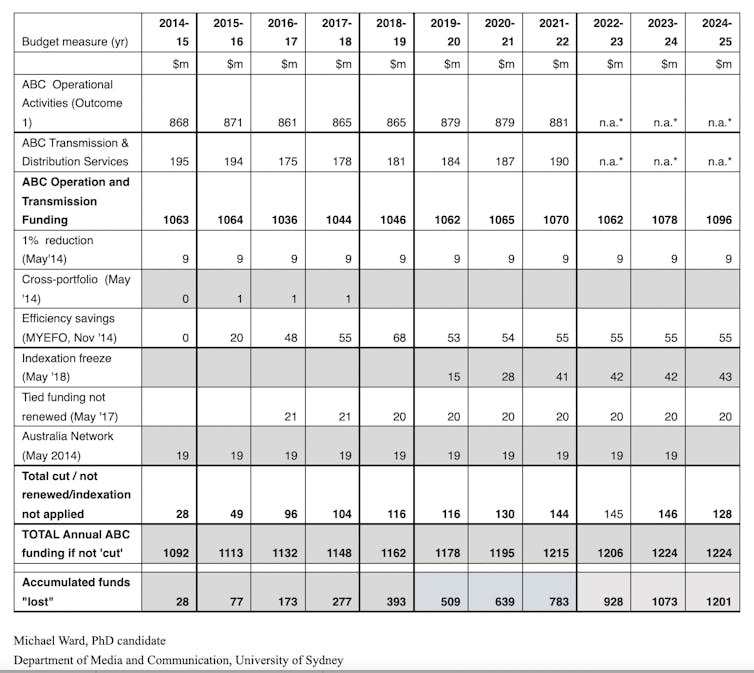The ABC's budget hasn't been restored – it's still facing $1.2 billion in accumulated losses over a decade
- Written by Alexandra Wake, Program Manager, Journalism, RMIT University

ABC Chair Ita Buttrose is “delighted” and Managing Director David Anderson says he now has “certainty[1]” for planning. However, the Morrison government’s pre-election announcement it would restore the ABC’s budget to 2018 levels doesn’t come close to making up for what has been lost in cuts to funding and staff.
Seven weeks ahead of the budget, Communications Minister Paul Fletcher has announced[2] the ABC will receive $3.284 billion over three years from July 2022, while SBS will receive $953.7 million over the same period.
Significantly, the government says it is scrapping its controversial indexation freeze on the ABC’s budget. This was imposed by then-Prime Minister Malcolm Turnbull in 2018 and meant the broadcaster’s funding did not keep pace with inflation. It led to drastic cuts[3] in programming and staffing in June 2020.
Read more: Latest $84 million cuts rip the heart out of the ABC, and our democracy[4]
Fletcher also announced the ABC funding would include $45.8 million for another three years for the broadcaster’s “enhanced news gathering” program, which is earmarked for local public interest journalism in regional communities.
However, the funding comes with strings attached.
The Morrison government has published what it calls a statement of expectations[5], a requirement for the ABC and SBS to provide a report each year detailing staff numbers in regional and remote Australia, as well as hours of programming tailored to those audiences.
Fletcher also said the ABC and SBS weren’t currently required to report on the number of hours of Australian drama and documentaries they show each year. Although these hours are published in the ABC annual report[6], the government will now require the ABC and SBS to provide further reporting on this through a national framework.
Impressive figures but it’s doesn’t undo the damage
To those who haven’t been following the ABC’s funding situation closely, the announcement may seem like impressive numbers. Certainly, the government’s line is the ABC will be “boosted” by scrapping the indexation freeze.
However, the end of the index freeze and the retention of the news gathering program still do not make up for the massive cuts already inflicted on the ABC.
As we noted in our research in 2019[7] and 2020[8], a total of $783 million was removed from ABC funding between 2014 and 2022. As the table below shows, these accumulated funding losses include a series of budget announcements, cancelled funding contracts, reduced or ended specific programs and implemented major cuts.
In fact, taking into account the government’s latest announcement, we now calculate the ABC’s accumulated lost funding from fiscal years 2014-15 to 2024-25 will reach a staggering $1.201 billion.
Tallying the ABC’s accumulated losses over a decade
The ABC lacks funds for future-proofing
This week’s announcement was warmly greeted as a significant change in the government’s position towards the public broadcasters. It is also certainly a positive response to the dire state of journalism in some areas, particularly in the suburbs and regional and remote communities, where the closure of commercial newsrooms[14] has left many without a local journalist or any local news service.
But we’d argue more needs to be done. The ABC still gets only about half the per capita government funding other democratic countries[15] provide to their national broadcasters.
Read more: Local news sources are closing across Australia. We are tracking the devastation (and some reasons for hope)[16]
This funding will also not future-proof the ABC or SBS with the extra resources needed to remain at the forefront of delivering digital content to Australians as they continue to change the way they access quality and trusted news and information.
The announcement may at least prevent the ABC from becoming an election issue.
The Friends of the ABC[17] had been gearing up its campaigning across the nation, fundraising to target key marginal seats. And last week, the Guardian Australia[18] reported the majority of Australians would support restoring funding to the ABC.
It remains to be seen if the announcement is sufficient to convince Australians who love and trust the national broadcasters that the Coalition has actually has done enough to support them.
References
- ^ certainty (www.theguardian.com)
- ^ announced (www.theaustralian.com.au)
- ^ drastic cuts (about.abc.net.au)
- ^ Latest $84 million cuts rip the heart out of the ABC, and our democracy (theconversation.com)
- ^ statement of expectations (www.infrastructure.gov.au)
- ^ ABC annual report (about.abc.net.au)
- ^ 2019 (theconversation.com)
- ^ 2020 (theconversation.com)
- ^ Senate Estimates question (www.aph.gov.au)
- ^ loss of the ten-year Australia Network contract (www.abc.net.au)
- ^ no longer the dominant broadcaster (www.lowyinstitute.org)
- ^ $100 million annually (www.aph.gov.au)
- ^ rejects the assertion (www.theaustralian.com.au)
- ^ closure of commercial newsrooms (theconversation.com)
- ^ democratic countries (site-cbc.radio-canada.ca)
- ^ Local news sources are closing across Australia. We are tracking the devastation (and some reasons for hope) (theconversation.com)
- ^ Friends of the ABC (www.abcfriends.net.au)
- ^ Guardian Australia (www.theguardian.com)

















